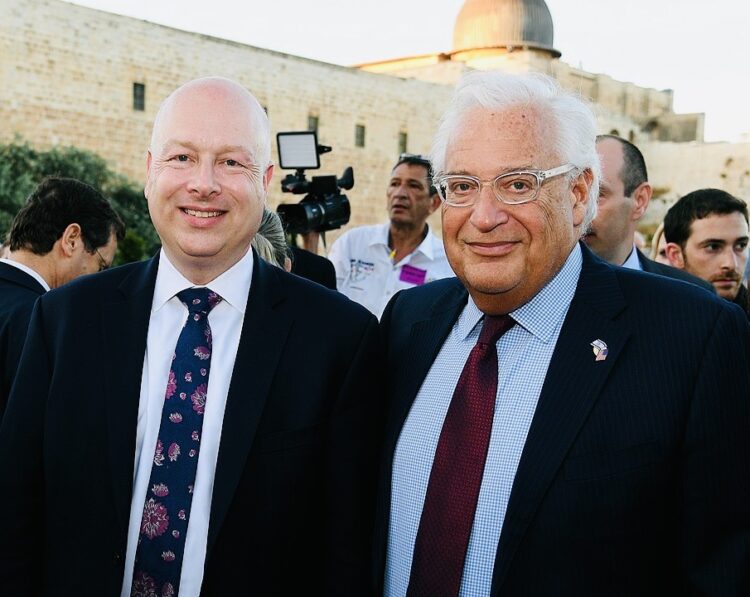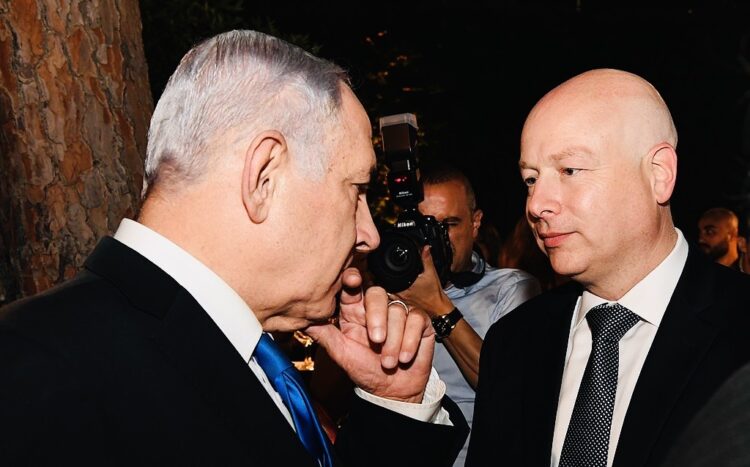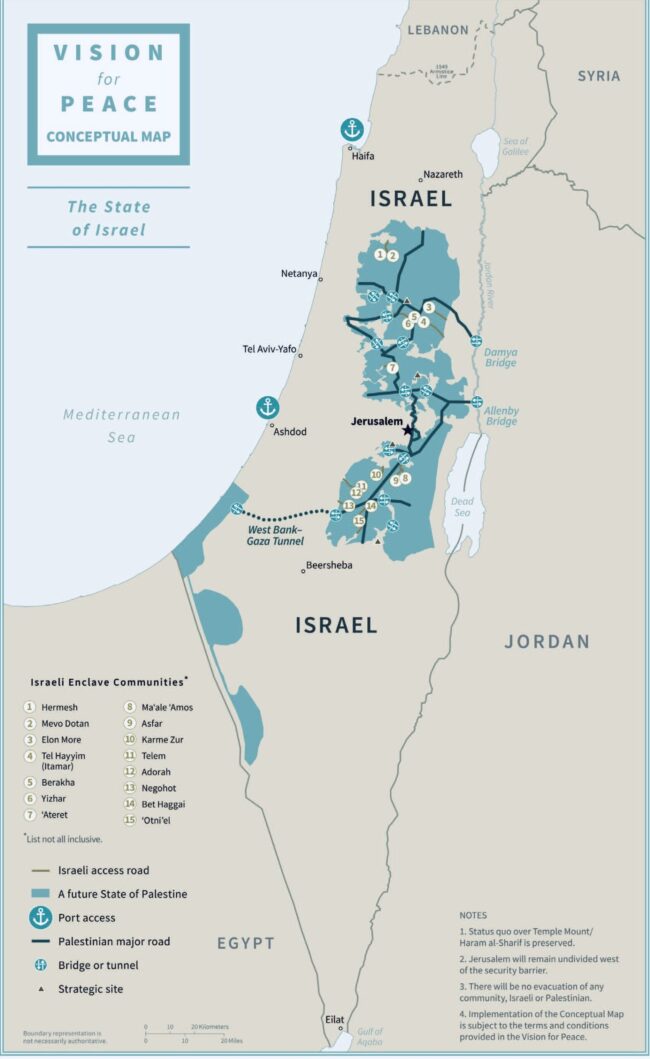Jason Greenblatt, one of the architects of Donald Trump’s ill fated plan to resolve Israel’s conflict with the Palestinians, has written a comprehensive book about his days as a U.S. diplomat.
As its longish title suggests, In The Path of Abraham: How Donald Trump Made Peace In The Middle East — And How To Stop Joe Biden From Unmaking It (Wicked Son) tends to be unabashedly partisan.
Nonetheless, his book is well worth reading. Greenblatt, formerly Trump’s chief legal officer, has a firm grasp of the issues and states his opinions boldly and clearly.
An observant Jew, a “passionate” supporter of Israel and a diehard Republican, Greenblatt is a dyed-in-the-wool conservative in terms of his beliefs concerning Israel’s dispute with the Palestinians and its occupation of the West Bank.
In accordance with the right-wing discourse in Israel, he dismissively refers to “the so-called ‘occupied territories’ and cavalierly claims that Israel settlements have not been an “obstacle” to peace, but actually “an inducement for the Palestinian leadership to sit down at the bargaining table.” And he is a skeptic with respect to the notion of Palestinian statehood. Dismissing the utility of a two-state solution, he writes, “For now, and at least for many years to come, a Palestinian state should be put on the diplomatic back burner.”
Given Greenblatt’s opinions, one can readily understand why the Palestinian Authority reacted furiously to his ideas for defusing Israel’s dispute with the Palestinians.
“The Trump administration’s approach to the Middle East challenged the myth that America has to be an ‘honest broker’ — that is, indifferent to the fate of its chief ally, Israel — in negotiations with its Arab neighbors,” he states. “Our approach showed that America’s willingness to be stalwart in support of a key ally is respected, not reviled, and that Israel’s acceptance lies not in the extent of the concessions it is willing to make, but in the inherent value it has to its neighbors, both technologically and militarily.”
U.S. diplomacy during the four-year Trump era was grounded in two principles, he explains.
“First, we recognized not only the futility, but the danger — both to Israel and the region — by continuing to allow the Palestinian leadership a virtual veto on Israel’s ability form relationships with other Arab countries,” he writes.
The second principle was based on the Trump administration’s assumption that Arab advocacy of Palestinian statehood did not prelude an Arab interest in forming formal relations with Israel.

Combining these concepts, Greenblatt and his colleagues — Trump senior advisor Jared Kushner and U.S. ambassador to Israel David Friedman — devised an “alternative strategy” to advance peace in the region. “Wouldn’t it be wise to look, simultaneously, at both a plan to address the Israeli-Palestinian conflict, while also making a parallel effort to engage Arab nations in establishing closer cultural and economic ties with Israel?”
Greenblatt, of course, is referring to the 2020 Abraham accords, during which Israel normalized its relations with the United Arab Emirates, Bahrain, Morocco and Sudan in just a matter of months. To Greenblatt, the Abraham accords not only foster economic cooperation, but “represent the beginning of an ever more powerful and united front in the face of threats from Iran, a common foe.”
Not surprisingly, he is contemptuous of Barack Obama’s Middle East policies. Savaging the Obama administration’s abstention on United Nations Security Council resolution 2334 condemning Israeli settlements, he blasts it as “cynical and vindictive” and an “outrageous abandonment” of Israel.
Greenblatt believes that Obama’s focus on Israel’s settlement policy in the West Bank distracted him from dealing effectively with Iran’s nuclear program and its support of regional proxies such as Hezbollah and Hamas.
Prior to his appointment as Special Representative for International Negotiations, Greenblatt was a high-ranking official in the Trump real estate empire. “My relationship with Trump was … all business,” he says, describing his boss as “a man driven to succeed in whatever task lay before him.”

Trump offered Greenblatt — the son of Hungarian Holocaust survivors — a job in government a month after he was elected president. Trump wanted him to strengthen the United States’ standing in the Middle East, which, he believed, had “suffered tremendously” under his predecessor. In addition, Trump asked him to upgrade America’s ties with Israel and to seek a solution to Israel’s perennial conflict with the Palestinians.
“The national media consensus seemed to be that I, much like my boss, was dangerously out of my depth,” he writes. Greenblatt concedes this argument was correct: “I couldn’t honestly claim the slightest experience as a diplomat.”
By his reckoning, the United States needed to adopt a fresh attitude to peacemaking. “It was essentially American policy to consider the ‘narratives’ of Israel and the Palestinian leadership equally valid, equally compelling, and equally deserving of serious attention.” This “impartiality” was “absurd,” he says, rejecting the theory that there are always two sides to every story.
“We were going to throw out the old diplomatic ‘rule book’ precisely because the old ‘rules’ no longer resonated with present-day reality … It was time to stop pretending. It was time to face facts. It was time to speak hard truths.”

The Trump administration reinvented the peace process: “It didn’t make sense to us that the conflict between the Israelis and the Palestinians should be considered in isolation as it had been so far. If we could move on two simultaneous and parallel political tracks to craft a satisfactory agreement between Israel and the Palestinian leadership and pursue agreements between Israel and its key Arab neighbors at the same time (with or without the Palestinians), that would be the proverbial game-changer.”
He elaborates: “What our team had already seen quite clearly is that the absence of peace with the Palestinian leadership … was no longer an insurmountable barrier.”
Greenblatt supported Trump’s recognition of Jerusalem as Israel’s capital, though he realized it could wreak havoc on his diplomatic efforts.
Trump’s peace proposal, “Peace to Prosperity,” envisaged a non-contiguous Palestinian state in about 70 percent of the West Bank, including the Jordan Valley, and in the Gaza Strip. The West Bank and Gaza would be connected by a network of roads and tunnels. Israel would retain sovereignty over all its settlements in the West Bank. The Palestinian capital would be in Abu Dis, a suburb of Jerusalem. Eastern Jerusalem would be part of Israel’s capital. Investments to the tune of tens of billions of dollars would be channelled into the Palestinian economy.

“We anticipated that our plan would not be warmly greeted by the Palestinian leadership, to put it mildly,” he says. “Nevertheless, we thought it was an honest reflection of today’s realities.” It would give Israel “real security” and the Palestinians the power to govern themselves, but not “the power to continue to threaten Israel.”
As expected, Mahmoud Abbas, the president of the Palestinian Authority, rejected it as totally one-sided in favor of Israel. Greenblatt expresses disappointment that Abbas was not more flexible. What he conveniently overlooks is that “Peace to Prosperity” allotted less than 20 percent of historic Palestine to the Palestinians.
Greenblatt was no longer working for Trump when the Abraham accords were signed, but he believes they were the culmination of his administration’s diplomacy.
In his view, they are of the utmost importance, having confounded “the conventional wisdom that Israel has to accept the creation of a Palestinian state … to have warm relations with other nations in the region.” Or as he puts it elsewhere in his book, they prove that Palestinian statehood is not “the sine qua non of greater Israeli-Arab cooperation, but its principal stumbling block.”
Greenblatt acknowledges that the Biden administration has charted its own course in the Middle East and repudiated Trump’s agenda. He warns that the foreign policy success of the Abraham accords will be set back or undone if Biden fails to expand it and pursues “misguided” regional objectives.
As an example, he cites Biden’s attempt to rejoin the 2015 Iran nuclear agreement, which he brands as a “weak” and “disastrous deal.” Greenblatt, too, warns that a decision by Biden to reduce the United States’ “footprint” in the Middle East will have dire consequences on Israel and America itself.
Greenblatt’s views and assumptions are sometimes glib, questionable and wrong-headed, but In The Path Of Abraham stands as a thoughtful and worthy contribution to the historiography of the contemporary Middle East.
